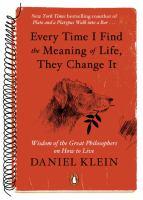
I wonder if I have a problem. I definitely have a tendency to seek spiritual inspiration from super-rational thinkers rather than from rabbis and priests and theologians.
Now in his twilight years, Klein has formed this book from a notebook he started as a young college student and abandoned in midlife. He titled that notebook "Pithies," and it contained short quotes from major thinkers he was studying, followed by his reactions to each. He abandoned the project at the time as naive and futile, yet in revisiting the notebook more recently found value in it, and so emerged this book.
I still take great pleasure in playing around with philosophical questions, the ones that [Bertrand] Russell is the first to admit have no unequivocal answers. . . . I guess this quality makes me a Cerebral Hedonist, although some would say it makes me a mental masochist.
The book follows the format of Klein's old notebook: he shares a "pithy," then reacts to it. The reflections--most a few pages--introduce context for each thinker and idea before spinning into the meaning and value Klein takes from each. Some are abstract musings, while others are pragmatic, situated, and specific. All are at least a bit autobiographical, and all are accessible introductions to the different veins of philosophical thought they represent.
As Klein notes in his epilogue, the theme that seems to unify the ideas is finding meaning in life by living fully in the moment. Some explicitly express that theme while others provide a more roundabout route to it, and they come at it from many different perspectives. The idea is one that appears to have resonated with Klein throughout his life and presented itself to him in many forms--or, at least, he has found the theme in his interpretations of various thinkers.
Overall, the book is an easy and engaging interaction with a variety of philosophies' pursuit of "the meaning of life." Quite enjoyable.
Finally, a bit of Klein's reaction to the quote from Reinhold Niebuhr that is the book's title:
Even as man contemplates the divine, he remains stuck with a finite mind that can never get a comprehensive bead on transcendent values. A perfect understanding of sin is ultimately beyond us. We cannot climb out of this existential duality; we possess the ability to ponder our mortality, good and evil, and the "meaning of life," but we are unable to ever really see the Big Picture. We just don't have the equipment for it.
Often, Niebuhr displayed a sense of humor about what he saw as man's [sic] predicament. He concluded one sermon by saying, "What a contradiction--to be the judge of all things and yet to be a worm of the earth." Not exactly a thigh-slapper, but not bad for a sermon.
